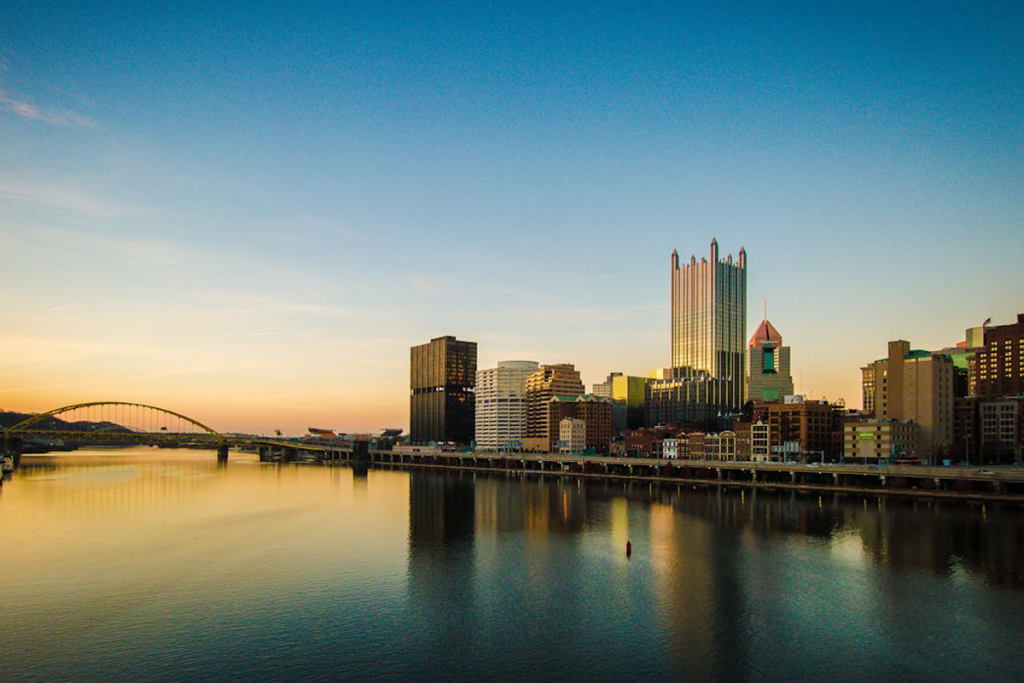| May 19, 2025
The Regional Impact and Security Risk of Pittsburgh’s Global Rise

Pittsburgh’s Recognition as a Top 10 Global Travel Destination
Pittsburgh was one of only three U.S. cities to earn a place on Lonely Planet’s Global Best in Travel in 2025. By joining this list, Pittsburgh joins the ranks of renowned destinations such as Toulouse, France; Genoa, Italy; Curitiba, Brazil; and Mallorca, Spain.
National Geographic soon followed, dubbing the “hilly tech town” of Pittsburgh a “top unexpected global travel destination,” alongside Paris, France; and Montevideo, Uruguay.
Pittsburgh is a Magnet for Tourism and Business
- Cultural Appeal: Museums like the Andy Warhol Museum and Carnegie Museum of Natural History, a thriving food scene, and festivals like the Three Rivers Arts Festival draw over 20 million annual visitors.
- Technology and Innovation: Dubbed the “East Coast Silicon Valley,” Pittsburgh hosts 1,500+ tech firms, including Google, Gecko Robotics, and Affirm.
- Global Events: The city will host the 2026 NFL draft, and a number of upcoming international conferences and corporate summits continue to increase Pittsburgh’s global connectivity.
This growth and newfound interest in Pittsburgh as a global travel destination may be a double-edged sword. While tourism revenue and job opportunities increase, Pittsburgh’s infrastructure, public safety – to include law enforcement and emergency medical services, and communities will face pressures that may impact the security of the region.
New Security Vulnerabilities in The East Coast Silicon Valley
Safety at Pittsburgh’s Major Events
From the 2026 NFL draft to potentially greater attendance at 2025’s number one rated ballpark in the MLB, key risks of increased crown sizes include:
- Opportunistic theft in packed areas, such as the North Shore, Strip District, and Oakland.
- Delayed emergency response due to strained police resources and heavy traffic.
Cyber Threats Targeting Businesses
- Data breaches: International conferences increase exposure to hackers, As Purplesec reports, cybercrimes will cost $10.5 trillion annually by 2025, and 71.1 million people fall victim to cybercrime every year.
- Phishing scams: Tourists and employees are prime targets for fake Wi-Fi hotspots or fraudulent booking sites.
Extremism and Targeted Violence in the Greater Pittsburgh Region
Pennsylvania has seen a significant rise in domestic extremism over the past several years, with Pittsburgh-area incidents including attacks on the Jewish community and attempted assassinations at political rallies. An increased number of high-profile events, as well as an increased number of tourists from across the globe, could attract malicious actors seeking media attention and/or vulnerable targets.
Strain on the City’s Law Enforcement
- Between 2018 and 2023, it is estimated that Pittsburgh’s police force shrank roughly 950 to 770 officers, or just below 19 percent.
- In 2024, a total of 103 officers left the city’s police department and the city’s ceiling for police bureau staff is down to 800 for 2025.
Pittsburgh’s Shifting Crime Patterns
While homicides in the city have dropped 15 percent in 2024, petty crimes like pickpocketing and car break-ins rose 9 percent in tourist-heavy neighborhoods. Additionally, the Pittsburgh Police Zone that covers downtown, Lawrenceville, and the Hill District leads the city in calls for police service.
Protecting Business Assets in a Global Hub
Corporate Espionage and Intellectual Property Theft Risks
As global attention to Pittsburgh increases, and the region’s tech startups continue to grow and are born into the market – many of which with direct ties to U.S. national security, so will the opportunity for nefarious state and nonstate actors to steal intellectual property.
Along with robust cybersecurity measures and monitoring user activity, employee training, security audits, and the actual safeguarding of company property and sensitive areas can mitigate the risk corporate espionage and IP theft poses to the Pittsburgh region’s business community.
Executive Protection for VIPs
Close to 73 percent of corporations have implemented specific security arrangements for their c-suite executives, and 76 percent of the companies with specific executive security arrangements utilize third-party vendors or consultants.
Corporate executives and high net worth individuals traveling to Pittsburgh may utilize proprietary executive protection teams, but many will also outsource executive protection services to local private security companies who are licensed to provide armed close protection, and have the operational capacity to do so.
Securing Events and Facilities
With Pittsburgh hosting more high-profile events, venues should upgrade security to include advanced surveillance, strict access controls, and staff and visitor screening. While privacy concerns are always an important consideration, technologies like AI-powered cameras and facial recognition can be adopted to detect and respond to incidents and manage large crowds efficiently.
Collaboration between event organizers, law enforcement, and private security is essential. Risk assessments, staff training, and clear communication help address venue-specific vulnerabilities and ensure rapid emergency response.
Balancing Risk and Opportunity in the Greater Pittsburgh Region
Pittsburgh’s ascent as a top global destination brings undeniable benefits such as economic growth and increased international connectivity. The city’s museums, tech sector, and major events are drawing global attention and a steady influx of visitors. Yet, this same success introduces a spectrum of new risks: from opportunistic crime and cyber threats to the challenges of crowd management and the specter of extremism. A shrinking police force and rising pressure on public safety resources underscore the importance of a proactive, layered approach to security.
Protecting intellectual property, ensuring executive safety, and securing facilities require not only robust internal policies but also collaboration with experienced security partners. Residents, too, must adapt to a city that is more dynamic but also more complex, staying alert to shifting crime patterns and participating in community safety initiatives.
Pittsburgh’s ability to balance its newfound opportunity with evolving risks will define its future as a premier global city. By embracing advanced technology, fostering public-private partnerships, and leveraging the expertise of security professionals attuned to the region’s unique landscape, Pittsburgh can continue to thrive – safely and securely – on the world stage.
